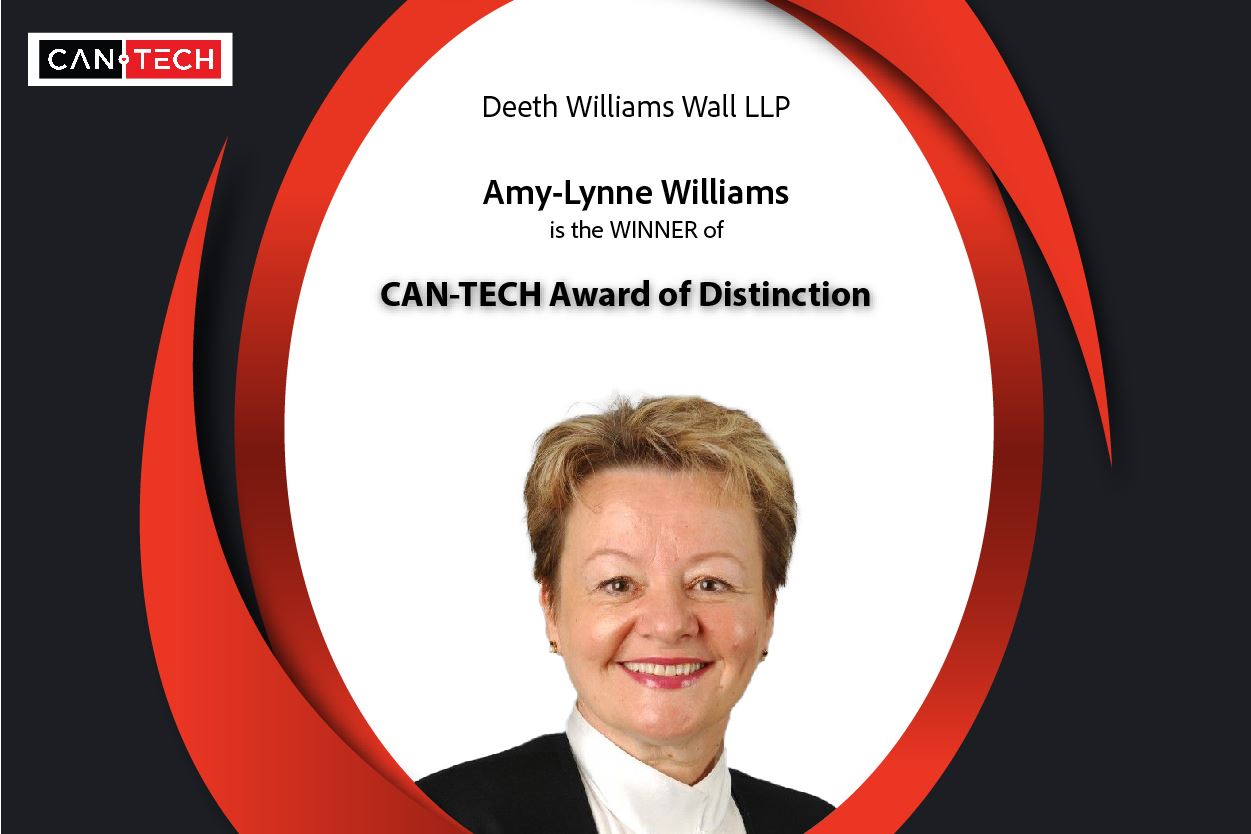 We are very pleased to announce Amy-Lynne Williams as the winner of the inaugural CAN-TECH Award of Distinction.
We are very pleased to announce Amy-Lynne Williams as the winner of the inaugural CAN-TECH Award of Distinction.
This award is in recognition of her extraordinary career as a leading technology lawyer. Over her more than forty-year career, Amy-Lynne has shaped the practice of technology law in Canada and what it means to be a technology lawyer with a Canadian and international practice including:
- At a time when there was no Canadian technology (or privacy) law, adapting the principles of Canadian commercial, contract and intellectual property law to the challenges posed by the adoption of computing technologies, the introduction of personal computing, the advent of the Internet and the adoption of mobile technologies;
- Establishing a Canadian technology and IP boutique law firm that is nationally recognized for its expertise in technology law and cyber security and that has been responsible for many technology firsts over its almost 30 years of operation;
- Taking leadership roles in the development of the premier Canadian and international technology organizations;
- Sharing her expertise and insights through speaking engagements, seminars, and articles;
- Fostering technology law through her mentorship of students, associates, and colleagues;
- Demonstrating, throughout, competence, integrity, and professionalism; and
- Bringing, to the practice of technology law for her clients and colleagues, a sense of fun.
She stands as a model to other practitioners.
Background:
When Amy-Lynne began her legal career in the 1980s in Ottawa as the first General Counsel of SHL Systemhouse, there was no computer law and no privacy law. Amy-Lynne was one of the very few Canadian practitioners who were adapting the principles of commercial, contract and intellectual property law to the adoption of computing technologies by business and government and the rise of personal computing. This meant wrestling with the novel issues raised by these technologies and coming up with practical responses. The solutions that Amy-Lynne negotiated became a baseline for Canadian technology practice. As one client noted in the midst of negotiations on a thorny issue “Amy-Lynne’s way of doing things is the Canadian standard on this issue.” In those early days, she also gave evidence to the Parliamentary Committees looking into questions such as “How should the law deal with unauthorized access to computers?” and “Is Software copyrightable?” Since then, in recognition of her expertise, she has acted as an expert witness and as an international commercial arbitrator.
As the practice area evolved, Amy-Lynne became convinced that there was a different way to practice law. In 1994, she and six colleagues established Deeth Williams Wall LLP (DWW). DWW was different. It provided its clients with specialized advice on technology law and intellectual property that was grounded in an understanding of the technology and its business impacts, but it also made technology use essential to its operation. Amy-Lynne was DWW’s first Managing Partner and led
the firm for its first five years. During that time, DWW provided computers, document processing software and email to the firm’s lawyers when none of this was common practice in Canadian law firms. Additionally, DWW established the infrastructure needed for lawyers to work remotely, decades before that became a common practice.
She has shared her knowledge and expertise writing and speaking extensively on technology issues. She was one of the earliest speakers to address the Toronto Computer Lawyers Group (TCLG), presenting in the early 1980s. She has spoken throughout her career to diverse business and legal organizations including as recently as 2019 when she spoke on the impacts of Artificial Intelligence.
Amy-Lynne always felt the need for a Canadian voice in technology law. She was one of the small group of practitioners who assembled in 1996 to found the Canadian Information Technology Law Association (now the Canadian Technology Law Association (CAN-TECH)). She became the second President in 2000, and she continues to be an active supporter of the organization today – encouraging all young technology lawyers to become members.
From the 1980s, she has been an active participant in the Computer Law Association (CLA), rising to Chair of the Program Committee and then, in 2005-2006, to President. As President, Amy-Lynne was responsible for the rebranding of the CLA as the International Technology Law Association (ITechLaw) and refocusing the organization from a Washington D.C.-centric organization to one concerned with international reach, broadening its international membership and its conference locations, and forever influencing the future direction and character of global technology law.
Throughout her career, Amy-Lynne has acted as a mentor and contributed to the development of her colleagues. DWW articling students and lawyers, who learned the practice of technology law under Amy-Lynne’s watchful eye, have gone on to successful careers at WeirFoulds, Baker McKenzie, PayPal, Manulife, Royal Bank of Canada, Varicent, the Ontario Ministry of Health, and University Health Network, among others. Her mentorship has never been limited just to DWW personnel. She has acted as a mentor to lawyers working in a variety of firms, always been available to provide career advice but also encouraging them to become active participants in groups like CAN-TECH and ITechLaw. You can see her encouragement manifested in ITechLaw (e.g., John Beardwood, Elisabeth Symons) and CAN-TECH (e.g., Jennifer Davidson, Lisa Lifshitz).
Amy-Lynne’s professional competence, integrity and civility is summed up in the comments of Dr. C. Ian Kyer who expressed what it is like to work with Amy-Lynne:
“I have worked with Amy-Lynne Williams for more than thirty years. Amy-Lynne is one of the most competent and helpful lawyers it has been my pleasure to work with during this time. It was never easy being on the other side of Amy-Lynne, but because of her professionalism, civility, and integrity, it was always a pleasure. Throughout, she was fair, reasonable, perceptive, imaginative, and civil. One could not ask for more in working with counsel on the other side.”